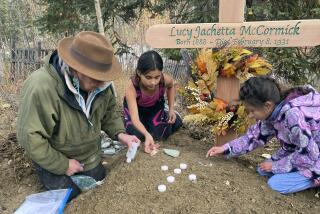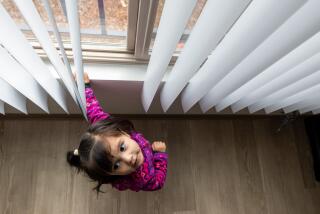Homeless Alaskans reconnect with families through Facebook group
Reporting from ANCHORAGE — When Kevin Oozevaseuk’s family left their island village and visited Anchorage 700 miles away, they sometimes walked the streets downtown, asking panhandlers if they had seen their troubled 38-year-old relative.
“He’s been homeless in Anchorage for years,” said his cousin, Michelle Kubalack. “No one was able to get in touch with him.”
Oozevaseuk was found dead on a park bench July 2. But before he died, Oozevaseuk had made contact with family after his cousin tracked him down using an electronic network of Alaska families called Forget Me Not.
The group was started this summer in an effort to reunite families and, in some instances, draw people off the streets. Named in part for the tiny blue state flower, it was created by Alaska Native rapper and activist Samuel Johns.
Johns, 29, said a woman from the Tlingit village of Angoon approached him a few months ago at an Anchorage gas station and asked for money. He bought her Cheez-Its and a muffin. They began to talk.
“When I asked if she wanted to go home, her whole mood changed,” he said. “I asked if I can find her a way home. She looked kind of hopeful.”
He thought of the woman’s relatives. “A lot of people have someone that they wonder about,” he said.
To reach the widest audience, Johns turned to Facebook, which has become a go-to communication tool for remote Alaskans who might lack flush toilets but go online to barter firearms and freezers.
Forget Me Not is part bulletin board, part tribal fire.
Daughters post pictures of missing mothers: “Love you ma. I wish I knew you better and you didn’t have to live like that.”
Volunteers snap pictures of homeless people and post their names and hometowns, hoping someone will recognize them. “His message to family … Not to worry he will be back on his feet real soon!!”
In villages scattered across Alaska, families are desperate for news of loved ones who by choice or misfortune are homeless in Alaska’s largest city. A disproportionate number are Alaska Native.
Already, more than half of Alaska’s 1,785 homeless live in Anchorage, according to a 2014 report by the U.S. Department of Housing and Urban Development.
“Almost every day we get phone calls from people looking for their brother, son, father, sister,” said Lisa Sauder, director of a longtime downtown soup kitchen, Bean’s Cafe.
With oil prices slumping and state leaders slashing spending on government services, Sauder expects the ranks of homeless to grow. “As the economy gets worse in Alaska, we are going to see more people coming to Anchorage seeking employment or opportunities that may not exist,” she said.
Some arrive as visitors and choose to stay. Others come to the city for medical care or for a short visit and struggle to pay airfare home, with flights from Anchorage to some villages more expensive than a flight from Anchorage to New York.
The vast distances of Alaska make the uncertainty of their fates weigh heavily on families back home.
Marsha Riley of Bethel said her brother, Johnny Nagasiak, left home in 2010 and vanished from the family’s view.
“Every now and again he’d call and say, ‘I’m doing OK. I’m living in a tent over here. Don’t worry about me,’” Riley said.
Nagasiak struggled with drinking, she said. He had spent time in prison and had a long rap sheet. He was the last of her three brothers still alive.
Every time she heard of someone dying outdoors in the city, she wondered if it was Johnny.
In June, her brother made contact with a family member in Anchorage. Riley posted his picture to the Forget Me Not Facebook page. Nine days later, Nagasiak was sleeping at her house, battling withdrawal and stringing beadwork.
Every step of the reunion played out on Facebook, from the first prayers of thanks to pictures of his visit to the gravesites of their mother and brothers.
But sometimes, even the best efforts cannot bring someone home safely.
Family members had been trying hard to connect with Oozevaseuk, a Siberian Yupik. They wanted to tell him his mother had died, his cousin said. Like many homeless, Oozevaseuk battled mental illness, she said.
A few weeks before Oozevaseuk’s death, Kubalack posted to the Forget Me Not group. “Hello! Has anyone seen Kevin Oozevaseuk? Our family has been trying to find him.”
A woman recognized him from church and passed along the message. He phoned Kubalack’s mother a couple of weeks before his death.
“My mom said that when she talked to him before he died, he said that the person that called him was from a Presbyterian church and it sounded like they had taken good care of him.”
Hopkins is a special correspondent.
ALSO:
President Obama to visit Alaska’s Arctic region in bid to fight climate change
In Colorado’s Prison Valley, corrections are a way of life
Residents of low-income South Bronx want reassurance amid Legionnaire’s disease crisis
More to Read
Sign up for Essential California
The most important California stories and recommendations in your inbox every morning.
You may occasionally receive promotional content from the Los Angeles Times.










